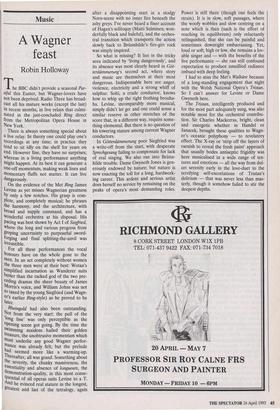Music
A Wagner feast
Robin Holloway
The BBC didn't provide a seasonal Par- sifal this Easter, but Wagner-lovers have not been deprived. Radio Three has broad- cast all his mature works (except the last) in recent months, in live relays that culmi- nated in the just-concluded Ring direct from the Metropolitan Opera House in New York.
There is always something special about a live relay. In theory one could play one's recordings at any time; in practice they tend to sit idly on the shelf for years on end. However fine, they have no surprises; whereas in a living performance anything might happen. At its best it can generate a one-off momentum, making weak lines and momentary fluffs not matter. It can live dangerously.
On the evidence of the Met Ring James Levine as yet misses Wagnerian greatness by only a few notches. His grasp is com- plete, and completely musical; he phrases the harmony, and the architecture, with broad and supple command, and has a wonderful orchestra at his disposal. His Pacing was best shown by Act I of Siegfried, where the long and various progress from groping uncertainty to purposeful sword- forging and final splitting-the-anvil was irresistible.
For all these performances the vocal honours have on the whole gone to the Men. In an act completely without women the three men were at their best: Wotan's simplified incarnation as Wanderer suits better than the racked god of the two pre- ceding dramas the sheer beauty of James Morris's voice, and William Johns was not so taxed by the young Siegfried (and Wagn- er's earlier Ring-style) as he proved to be later.
Rheingold had also been outstanding. ,Not from the very start: the pull of the long line' was only perceptible as the opening scene got going. By the time the swimming maidens hailed their golden treasure, the unobtrusive momentum which Must underlie any good Wagner perfor- mance was already felt; but the prelude had seemed more like a warming-up. Thereafter, all was grand. Something about the severity, the chunky massiveness, the essentiality and absence of longueurs, the demonstration-quality, in this most conse- quential of all operas suits Levine to a T. And he evinced real stature in the longest, greatest and last of the tetralogy, again after a disappointing start in a stodgy Norn-scene with no inner fire beneath the ashy greys. I've never heard a finer account of Hagen's soliloquy (Matti Salminen, won- derfully black and baleful), and the orches- tral transition which transports the action slowly back to Briinnhilde's fire-girt rock was simply inspired.
So what is missing? It lies in the tricky area indicated by 'living dangerously', and its absence was most clearly heard in Got- terdammerung's second act, where story and music are themselves at their most dangerous. Indispensable here are anger, violence, electricity and a strong whiff of sulphur. Solti, a crude conductor, knows how to whip up the right frothing brouha- ha. Levine, incomparably more musical, simply didn't let go: and one could sense a similar reserve in other stretches of the score that, in a different way, require some- thing elemental. But there is no question of his towering stature among current Wagner conductors.
In Gotterdammerung poor Siegfried was a write-off from the start, with desperate Sprechgesang failing to compensate for lack of real singing. We also ran into Briinn- hilde trouble. Dame Gwyneth Jones is gen- erously endowed by nature; but nature is now exacting the toll for a long, hardwork- ing career. This ardent and serious artist does herself no service by remaining on the peaks of opera's most demanding roles. Power is still there (though one feels the strain). It is in slow, soft passages, where the woofy wobbles and slow centring on a note which is then (such is the effort of reaching its equilibrium) only reluctantly relinquished, that she can be painful and sometimes downright embarrassing. Yet, loud or soft, high or low, she remains a lov- able singer and — with the benefits of the live performance — she can still confound expectation to produce unsullied radiance imbued with deep feeling.
I had to miss the Met's Walkiire because of a long-standing engagement that night with the Welsh National Opera's Tristan. So I can't answer for Levine or Dame Gwyneth here.
The Tristan, intelligently produced and for the most part adequately sung, was also notable most for the orchestral contribu- tion. Sir Charles Mackerras, bright, clean and energetic whether in Handel or Janacek, brought these qualities to Wagn- er's oceanic polyphony — to revelatory effect. The X-ray or 'strip off the layers of varnish to reveal the fresh paint' approach that usually bodes antiseptic frigidity was here musicalised in a wide range of tex- tures and emotions — all the way from dul- cet serenity early in the love-duet to the terrifying self-excoriations of Tristan's delirium — that was never less than mas- terly, though it somehow failed to stir the deepest depths.


























































 Previous page
Previous page